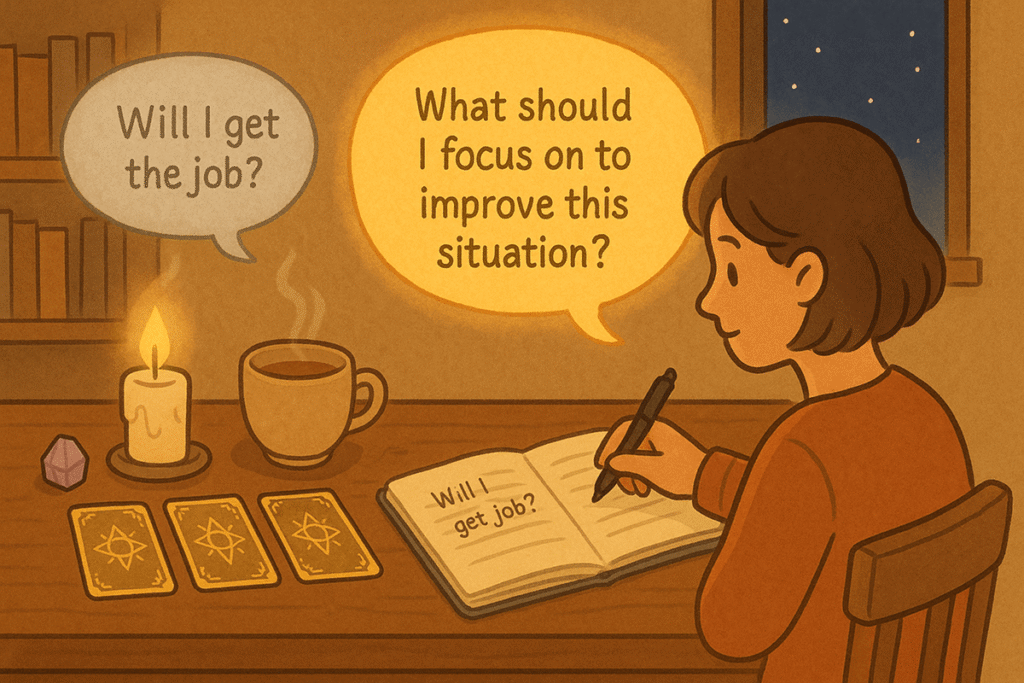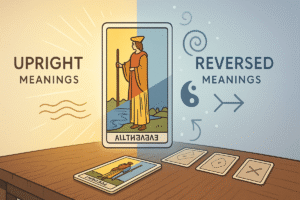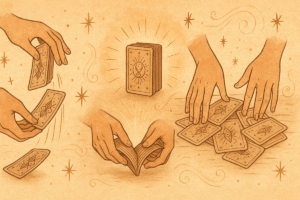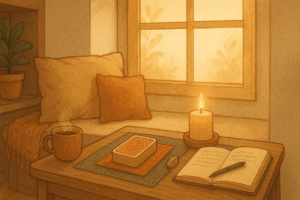Table of Contents
When I first started exploring tarot, I made the same mistake most beginners do. I’d sit down with my cards, shuffle them eagerly, and ask something like “Will my ex come back to me?” Then I’d stare at the Three of Swords wondering why the universe seemed so cruel. It took me months to realize the problem wasn’t with the cards or my shuffling technique. The issue was with my questions.
The way you frame your questions completely transforms your tarot experience. Instead of seeking predictions about an uncertain future, well crafted questions help you explore your inner landscape and discover insights you already possess. This shift from fortune telling to self reflection makes all the difference between a frustrating reading and a genuinely helpful one.
Why Question Framing Matters More Than You Think
Your questions set the entire tone for your reading. Think about it this way: when you ask a closed question that demands a yes or no answer, you’re essentially asking the cards to make decisions for you. But when you ask an open ended question, you’re inviting the cards to help you think through a situation more deeply.
I’ve noticed that predictive questions often leave people feeling powerless. You ask “Will I get promoted?” and depending on the cards, you either feel falsely confident or unnecessarily worried. Neither response actually helps you take meaningful action. The cards become a magical 8 ball instead of a tool for personal growth.
Open ended questions, on the other hand, put you back in the driver’s seat. When you ask “What qualities should I develop to advance in my career?” you’re acknowledging your own agency. The reading becomes about understanding yourself and your situation better, not about surrendering your power to predict the future.
Perhaps more importantly, reflective questions tend to generate more nuanced and useful insights. The tarot works best as a mirror for your subconscious mind, helping you access wisdom you already have but might not be consciously aware of. Predictive questions shut down this process, while exploratory questions open it up.
The Problem With Predictive Questions
Most people approach tarot wanting to know what will happen to them. It’s completely natural to feel this way, especially when you’re facing uncertainty. But predictive questions create several problems that can actually increase your anxiety rather than provide genuine guidance.
First, they encourage a passive mindset. When you ask “Will my relationship work out?” you’re positioning yourself as someone who has no influence over the outcome. This isn’t just disempowering; it’s also unrealistic. Your choices, actions, and growth absolutely affect what happens in your relationships.
Second, predictive questions often lead to what I call “reading shopping.” If you don’t like the answer you get, you might be tempted to ask the same question again, hoping for a different result. This creates an unhealthy dynamic where you become dependent on the cards for reassurance rather than developing your own decision making skills.
Third, trying to predict the future with tarot can actually increase anxiety about things beyond your control. When you focus on what might happen to you, you miss opportunities to focus on what you can actually influence. This shift in attention from external outcomes to internal responses is where the real magic of tarot happens.
I think the most problematic aspect of predictive questions is that they often carry an assumption that there’s only one possible future. Life is far more complex and dynamic than that. Your future depends on countless variables, many of which are within your influence. Questions that acknowledge this complexity tend to be much more helpful.
Transforming Closed Questions Into Open Invitations
The good news is that almost any closed question can be transformed into something more empowering and insightful. The key is shifting from asking about outcomes to asking about process, from focusing on what will happen to exploring how you can respond.
Let’s look at some common examples. Instead of “Will I find love this year?” try “What aspects of myself should I nurture to attract a healthy relationship?” The first question makes you a passive recipient of love or rejection. The second question acknowledges that attracting love involves your own growth and choices.
Rather than asking “Should I quit my job?” consider “What do I need to understand about my current work situation to make the best decision for my growth?” This reframe helps you explore the complexity of your situation instead of seeking a simple yes or no answer that might not account for all the relevant factors.
When facing financial concerns, instead of “Will I have enough money?” try “What beliefs or patterns around money might be worth examining right now?” This approach helps you explore your relationship with money, which often influences your financial outcomes more than external circumstances alone.
The transformation process usually involves adding words like “what,” “how,” or “where” to the beginning of your question, and including phrases that acknowledge your agency like “to support,” “to understand,” or “to develop.” These small changes create space for genuine insight and personal growth.
Questions For Different Areas of Life
Each area of life benefits from its own approach to question framing. Career questions, for instance, work best when they focus on skills, growth, and alignment with your values. Instead of asking whether you’ll get a specific job, you might explore what career path would best support your overall development or what skills you should prioritize developing.
For relationship questions, the most helpful inquiries usually explore your own patterns, needs, and growth edges rather than trying to predict someone else’s behavior. Questions about what you bring to relationships, what you’re learning from current dynamics, or how you can communicate more effectively tend to generate much more useful insights than wondering whether someone likes you.
Family dynamics can be particularly tricky to navigate with tarot. Instead of asking whether a difficult family member will change, you might explore how to maintain your boundaries while staying connected, or what family patterns you’re ready to heal within yourself. These questions acknowledge that you can only control your own responses, not other people’s choices.
Health related questions require special care since tarot isn’t a substitute for medical advice. Focus on questions about stress management, emotional wellbeing, or lifestyle changes rather than trying to diagnose or predict health outcomes. Questions like “What would support my overall wellbeing right now?” keep you in safe territory while still offering valuable guidance.
Money questions work best when they explore your relationship with abundance, spending patterns, or career alignment rather than trying to predict specific financial outcomes. You might ask about what beliefs about money are ready to be examined, or what steps would support greater financial stability.
Creating Your Own Empowering Questions
Once you understand the principles behind good question framing, you can create your own empowering inquiries for any situation. Start by identifying what you’re really concerned about, then ask yourself what aspects of the situation are within your influence.
If you’re worried about a relationship, what you’re probably really seeking is understanding about how to navigate the dynamic more skillfully. If you’re concerned about work, you likely want guidance on how to make decisions that align with your values and support your growth.
The most powerful questions often begin with “What,” “How,” or “Where.” What lessons am I ready to learn? How can I approach this challenge with greater wisdom? Where am I being called to grow? These question starters naturally lead to reflective, empowering inquiries.
I’ve found that questions work particularly well when they assume positive intention on your part. Instead of “Why do I always mess things up?” try “What would help me approach similar situations with greater skill?” This reframing acknowledges that you’re capable of growth without getting stuck in self criticism.
Sometimes the most helpful questions are the ones that help you understand your own motivations and desires more clearly. “What do I really want in this situation?” or “What would alignment look like for me here?” can provide profound insights that predictive questions simply can’t access.
Remember that there’s no perfect question for every situation. The goal is to ask something that helps you think more deeply about your circumstances and your responses to them. Trust your instincts about what feels most helpful to explore.
Making Peace With Uncertainty
Perhaps the hardest part of shifting to reflective questions is learning to be comfortable with uncertainty about the future. We live in a culture that values prediction and control, so it’s natural to want definitive answers about what’s coming next.
But I’ve come to believe that uncertainty isn’t something to be eliminated; it’s something to be danced with. When you stop trying to predict the future and start focusing on how to respond wisely to whatever comes, you develop a different kind of confidence. You begin to trust your ability to handle whatever life brings rather than needing to know what’s coming in advance.
This shift takes practice, and it’s okay to feel some resistance at first. You might find yourself occasionally slipping back into predictive questions, especially during stressful times. That’s completely normal. The goal isn’t perfection; it’s gradual progress toward a more empowering relationship with uncertainty.
Good questions help you develop what I think of as “response ability” – the ability to respond thoughtfully and skillfully to life’s challenges and opportunities. This is ultimately more valuable than knowing what might happen because it prepares you for anything that does happen.
When you frame your questions with curiosity rather than anxiety, tarot becomes a tool for developing wisdom, resilience, and self understanding. These qualities serve you far better than any prediction ever could, because they help you navigate not just one specific situation, but all the situations yet to come.
The cards become your thinking partner rather than your fortune teller, and that partnership can support your growth for years to come.
Frequently Asked Questions
Can I ask the same question multiple times if I don’t like the answer?
Repeatedly asking the same question, especially in a short timeframe, usually leads to confusion rather than clarity because your emotional state affects the reading. If you find yourself fixated on getting a different answer, it’s better to reflect on why the first reading made you uncomfortable rather than continuing to ask. Wait at least a few weeks or until something significant changes in the situation before revisiting the same question.
How long should I wait before asking about the same situation again?
Most experienced readers recommend waiting at least a month between readings on the same topic, or until circumstances have genuinely changed. This gives you time to implement insights from your first reading and allows the situation to evolve naturally. If nothing has changed since your last reading, the cards will likely give you the same message because the energy around the situation remains the same.
Is it okay to ask questions about other people?
Questions work best when they focus on your own actions, responses, and growth rather than trying to predict or control someone else’s behavior. Instead of asking “Will he call me?” try “How can I communicate my needs more clearly in this relationship?” This shift keeps you empowered and respects others’ free will while still giving you valuable guidance about the dynamic.
What if I get cards that seem confusing or don’t make sense?
If a reading feels unclear, the issue might be that you’re not connecting the cards back to your original question throughout the interpretation. Try journaling about the reading and returning to it after a few days with fresh perspective. Sometimes confusion signals that you’re too emotionally invested in the outcome to read clearly, which means it might be time to step back or seek a reading from someone else who can be more objective.







